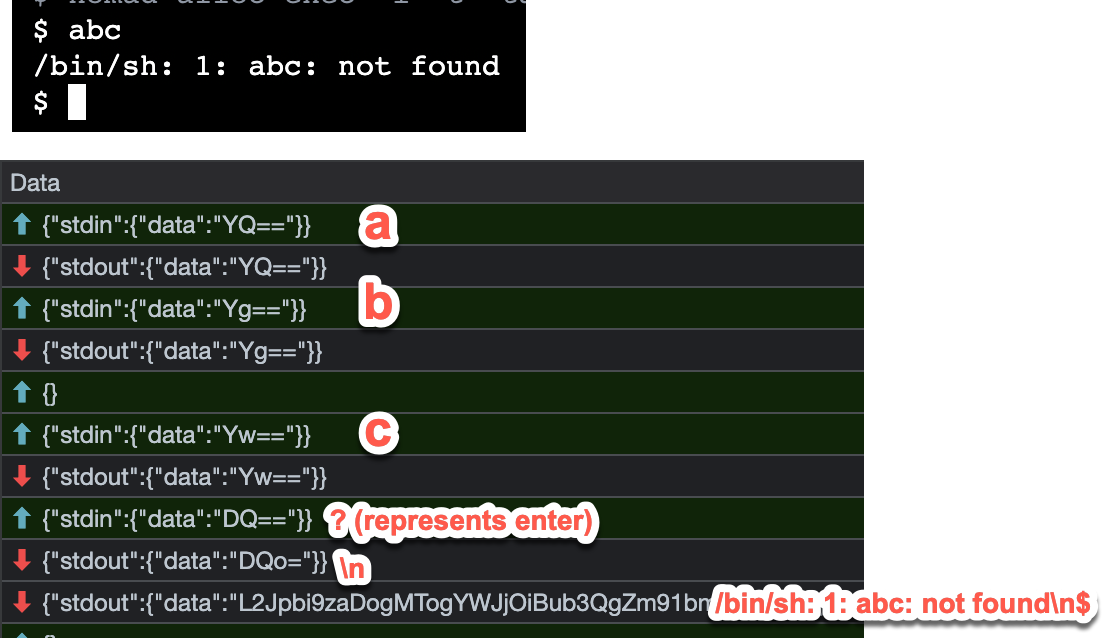Using a PTY without a command
I opened an issue in creack/pty for this question, but I actually think it probably belongs here as it's probably more to do with my usage of the library than anything wrong with the library.
I am using a websocket api that sends stdin messages and receives stdout and stderr output from the command as well as exit codes.
For example, this API is used in a web UI, with the following string of messages sent and received

This web UI uses xterm.js to provide a terminal-like input ui and to interpret the responses, including ansi escape sequences, into terminal output.
I am building a terminal application that would like to leverage this same API, so a "terminal-in-a-terminal" like thing, where stdin is sent to the API and responses received are rendered in my application.
I would like to use creack/pty as the response interpreter, handling ansi escape sequences and the like, and holding a view of the terminal session that I can read into a string and render to the screen of my application.
So the flow is roughly like:
- stdin sent to websocket connection
- response received
- write response to pty
- read entire pty to string
- render string to screen
- repeat
If I use creack/pty this way, I don't actually have a command to start - it's just a nice box that interprets ansi escape sequences for me and allows me to retrieve the current "string view" of the terminal.
Here is my attempt to get a command-less pty, write to it, and read from it:
package main
import (
"bytes"
"fmt"
"github.com/creack/pty"
"io"
"os"
)
func getPtyWithoutCommand() (*os.File, error) {
// this function just pty.StartWithAttrs with command-specific stuff commented out
pty, tty, err := pty.Open()
if err != nil {
return nil, err
}
defer func() { _ = tty.Close() }() // Best effort.
// if sz != nil {
// if err := Setsize(pty, sz); err != nil {
// _ = pty.Close() // Best effort.
// return nil, err
// }
// }
// if c.Stdout == nil {
// c.Stdout = tty
// }
// if c.Stderr == nil {
// c.Stderr = tty
// }
// if c.Stdin == nil {
// c.Stdin = tty
// }
//
// c.SysProcAttr = attrs
//
// if err := c.Start(); err != nil {
// _ = pty.Close() // Best effort.
// return nil, err
// }
return pty, err
}
func main() {
myPty, err := getPtyWithoutCommand()
if err != nil {
panic(err)
}
_, err = myPty.Write([]byte("test\n"))
if err != nil {
panic(err)
}
_, err = myPty.Write([]byte{4}) // EOT
if err != nil {
panic(err)
}
buf := new(bytes.Buffer)
_, err = io.Copy(buf, myPty)
if err != nil {
panic(err)
}
fmt.Println(buf.String())
}
I get the following error
❯ go run test.go
panic: write /dev/ptmx: input/output error
goroutine 1 [running]:
main.main()
test.go:52 +0x19c
exit status 2
Is what I'm trying to do sane at all? Is there a better way to achieve my goal here?
I was tackling a similar problem and creack's pty might be a bit too abstracted for what you want. I just used the golang standard xterm terminal emulator https://pkg.go.dev/golang.org/x/term and a pipe.
Here's a partial snippet as an example of what I mean. Your stdin stream is fed into the stdin_writer and your stdout is written to the writer, don't forget to Flush()!
stdin_reader, stdin_writer := io.Pipe()
reader := bufio.NewReader(stdin_reader)
stdout_writer := bytes.Buffer{}
writer := bufio.NewWriter(&stdout_writer)
rw := bufio.NewReadWriter(reader, writer)
t := term.NewTerminal(rw, prompt)
// constantly be reading lines
go func() {
for {
line, err := t.ReadLine()
if err == io.EOF {
log.Printf("got EOF")
}
if err != nil {
log.Printf("got err")
}
if line == "" {
continue
}
log.Printf("LINE: %s", line)
}
}()
- Problem with json when I unmarshal [] bytes into struct after converting "Id" is not correct
- Convert netip.Addr to net.IP for IPv4 address in Go
- Tour of Go exercise #18: Slices
- How to print the star pattern aligned to right hand side in GO lang
- golang issue when parsing data to bson for mongodb
- How to iterate over a union of slices passed in a generic function? (T has no core type)
- How to constrain type to types with index?
- Get a list of valid time zones in Go
- URL for latest stable Go release
- I can't query by UUID
- how to use a `switch` statement in Go
- What kind of operation is x%y in golang?
- Go check if a string is a valid path
- Recursive type constraint using a defined type rather than a type literal?
- How to validate an email address in Golang
- Failed to find any PEM data in key
- Gitlab-CI runner: ignore self-signed certificate
- How to strings.Split on newline?
- Why structs constructed from XML have empty fields?
- How to build a release version binary in Go?
- How to use Delve debugger in Visual Studio Code
- What's the Go idiom for Python's list.pop() method?
- Is the source code representation in the Go Programming Language the same as in Git?
- Convert string to integer type in Go?
- How to convert an int value to string in Go?
- MongoDB Go Driver v2: How to Marshal a Nil Custom Type as BSON Null?
- How to remove a cookie in Go
- Why is my outbound connection being refused?
- Check if IP address is in private network space
- How to import and use different packages of the same name